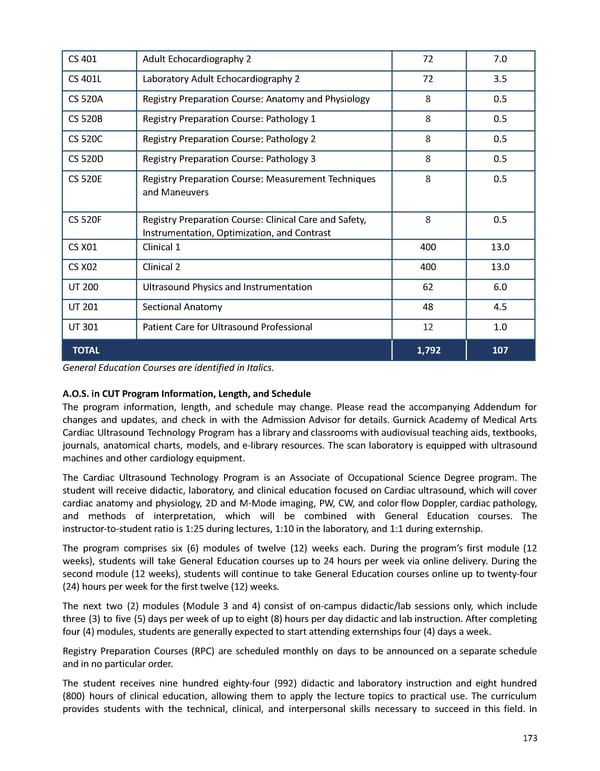CS401 Adult Echocardiography 2 72 7.0 CS401L Laboratory Adult Echocardiography 2 72 3.5 CS520A Registry Preparation Course: Anatomy and Physiology 8 0.5 CS520B Registry Preparation Course: Pathology 1 8 0.5 CS520C Registry Preparation Course: Pathology 2 8 0.5 CS520D Registry Preparation Course: Pathology 3 8 0.5 CS520E Registry Preparation Course: Measurement Techniques 8 0.5 andManeuvers CS520F Registry Preparation Course: Clinical Care and Safety, 8 0.5 Instrumentation, Optimization, and Contrast CSX01 Clinical 1 400 13.0 CSX02 Clinical 2 400 13.0 UT200 Ultrasound Physics and Instrumentation 62 6.0 UT201 Sectional Anatomy 48 4.5 UT301 Patient Care for Ultrasound Professional 12 1.0 TOTAL 1,792 107 GeneralEducationCoursesareidentifiedinItalics. A.O.S. in CUT Program Information, Length, and Schedule The program information, length, and schedule may change. Please read the accompanying Addendum for changes and updates, and check in with the Admission Advisor for details. Gurnick Academy of Medical Arts Cardiac Ultrasound Technology Program has a library and classrooms with audiovisual teaching aids, textbooks, journals, anatomical charts, models, and e-library resources. The scan laboratory is equipped with ultrasound machinesandothercardiologyequipment. The Cardiac Ultrasound Technology Program is an Associate of Occupational Science Degree program. The student will receive didactic, laboratory, and clinical education focused on Cardiac ultrasound, which will cover cardiac anatomy and physiology, 2D and M-Mode imaging, PW, CW, and color flow Doppler, cardiac pathology, and methods of interpretation, which will be combined with General Education courses. The instructor-to-student ratio is 1:25 during lectures, 1:10 in the laboratory, and 1:1 during externship. The program comprises six (6) modules of twelve (12) weeks each. During the program’s first module (12 weeks), students will take General Education courses up to 24 hours per week via online delivery. During the second module (12 weeks), students will continue to take General Education courses online up to twenty-four (24) hours per week for the first twelve (12) weeks. The next two (2) modules (Module 3 and 4) consist of on-campus didactic/lab sessions only, which include three (3) to five (5) days per week of up to eight (8) hours per day didactic and lab instruction. After completing four (4) modules, students are generally expected to start attending externships four (4) days a week. Registry Preparation Courses (RPC) are scheduled monthly on days to be announced on a separate schedule andinnoparticularorder. The student receives nine hundred eighty-four (992) didactic and laboratory instruction and eight hundred (800) hours of clinical education, allowing them to apply the lecture topics to practical use. The curriculum provides students with the technical, clinical, and interpersonal skills necessary to succeed in this field. In 173
 2023-2024 | Catalog Page 172 Page 174
2023-2024 | Catalog Page 172 Page 174